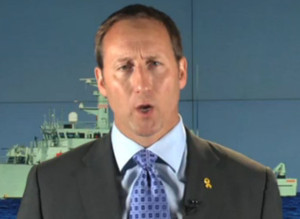As president of the Pacific Exchange in the late-1990s, Warren Langley oversaw the West Coast's biggest financial center, a trading floor where some 17 million shares of stock changed hands daily. Though he served at the pleasure of traders and investment banks such as Morgan Stanley, he is no longer interested in pleasing them. Yesterday, he stood on a hillside in San Francisco's Financial District in front Morgan Stanley's and Goldman Sachs' regional headquarters to declare his support for Occupy Wall Street West, a coalition of 50 groups planning a slew of anti-bank protests Friday.
"From the inside, I watched Goldman Sachs, the big banks, the hedge funds, bet our money and then get bailed out when they lost," said Langley, surrounded by protesters holding images of a devious-looking Mr. Moneybags (Monopoly) character. "I saw corporations and the 1 percent buy our congressmen and senators and then pay no taxes, get subsidies, and move jobs overseas. This is our last chance to level the playing field and let you and our kids and grandkids have the opportunities that I started with."
Langley, 69, began working in finance in the 1980s, rising to become CEO of Hull Trading Company, a $500-million proprietary trading firm active in stock options and derivatives. The job often involved pressuring the Securities and Exchange Commission (SEC) to loosen financial regulations. "I was just trying to push the boundaries of things that would help me make profits," he confesses. 'I didn't perceive the risk to the economy, and I think that is the part that really changed for me."
"From the inside, I watched Goldman Sachs, the big banks, the hedge funds, bet our money and then get bailed out when they lost," said Langley, surrounded by protesters holding images of a devious-looking Mr. Moneybags (Monopoly) character. "I saw corporations and the 1 percent buy our congressmen and senators and then pay no taxes, get subsidies, and move jobs overseas. This is our last chance to level the playing field and let you and our kids and grandkids have the opportunities that I started with."
Langley, 69, began working in finance in the 1980s, rising to become CEO of Hull Trading Company, a $500-million proprietary trading firm active in stock options and derivatives. The job often involved pressuring the Securities and Exchange Commission (SEC) to loosen financial regulations. "I was just trying to push the boundaries of things that would help me make profits," he confesses. 'I didn't perceive the risk to the economy, and I think that is the part that really changed for me."



























